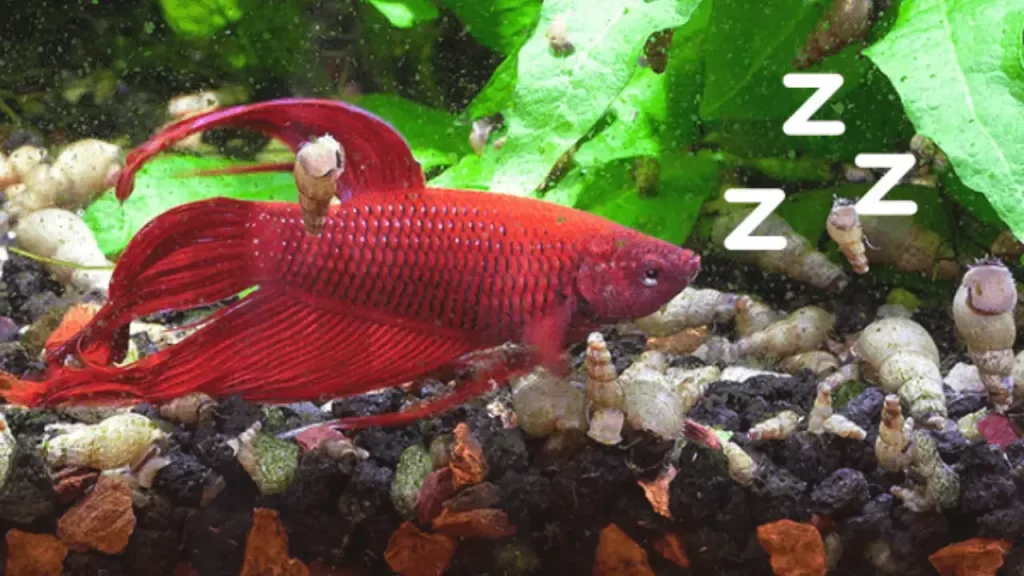
Betta fish, also known as Siamese fighting fish, is a popular choice for aquarium enthusiasts. These fish are known for their striking colors and long, flowing fins. But have you ever wondered how they sleep?
Betta fish do sleep, but their sleep patterns are different from those of humans. Unlike humans, they don’t have eyelids, so they can’t close their eyes to sleep. Instead, they enter a state of rest where they become still and their breathing slows down.
Betta fish can sleep in a variety of positions, including lying on their side, floating at the top of the tank, or resting on a plant or decoration in the tank. Some betta fish even create a bubble nest at the surface of the water to sleep in.
So, how long do betta fish sleep? Betta fish need about 8-12 hours of sleep per day, but this can vary depending on the individual fish and their environment. Factors such as water temperature, lighting, and water quality can affect their sleep patterns.

Table of Contents
Do Betta Fish Sleep?
Yes, betta fish do sleep. Like all animals, betta fish need to rest and recharge their bodies to stay healthy. Sleep is a crucial part of this process. Betta fish typically sleep at night when it is dark, although they may also take short naps during the day.
It is important to provide a comfortable and safe sleeping environment for your betta fish. This includes a clean and well-maintained tank with plenty of hiding spots and comfortable resting areas. A dimly lit tank at night can also help signal to your betta fish that it is time to sleep.
While sleeping, bettas will often tuck their heads into their bodies and remain very still. They may also change color or become paler while sleeping.
It is important to note that betta fish can be easily disturbed while sleeping, so it is best to avoid sudden movements or loud noises near the tank. This can disrupt their sleep and cause stress, which can lead to health issues over time.

How Do You Know if Your Fish is Sleeping?
Betta fish sleep patterns can be difficult to discern, and they may appear to be lethargic or even dead to new owners.
However, Bettas do sleep and can be found in various poses, such as curled up, upside down, or turned to one side. They may also fall asleep with their fins spread. One key indication that a Betta is sleeping is a fading of color, which acts as a form of camouflage to protect them from predators.
Bettas also tend to move their mouths and gills slower than usual when they are asleep.
As an owner of bettas, I can say that fish sleep for up to 16 hours a day. Betta fish spend much of the day sleeping. However, an inexperienced owner may think that their Betta fish is sick or even dead after this prolonged sleeping period. While Bettas sleep for long periods, their sleep is quite light, so they can easily be woken by sounds or movement in the water.
It’s an instinctual self-defense mechanism since Bettas are easily spotted by larger predatory fish.

When Do Betta Fish Sleep?
Betta fish typically sleep at night, being most active during the day. However, they are known to take short “catnaps” throughout the day as well.
Unlike other species of fish that are nocturnal, Bettas are active during the day and rest at night.
So, do fish keep their eyes open while they sleep?
Unlike most other fish, freshwater puffer fish have eyelids that allow them to close their eyes when they sleep. However, the majority of fish do not have eyelids. This is because the ancestors of fish first developed eyes that needed to remain moist, making them well-suited for an aquatic environment. Eyelids, on the other hand, have evolved in land-dwelling creatures to prevent eyes from drying out.
To mimic a natural sleep cycle for your betta, it’s recommended to limit the hours of tank light during the day and ensure that the tank is in darkness at night. This will help your betta understand when it’s time to sleep.

Where Do Bettas Sleep?
Betta fish will sleep anywhere in their enclosure where they feel comfortable and safe. This can include the bottom of the tank, near the surface, in decorative houses, among vegetation, or in other hiding places.
It’s essential to provide your betta with suitable sleeping spaces in the aquarium. They need plenty of hiding places and resting spots, such as live or artificial plants, decorations, or caves. Bettas also prefer aquariums with low lighting at night, as bright lights can disrupt their sleep patterns and stress them out.
How to Make Your Betta Fish Sleep Well?
To ensure your betta fish sleeps well, you should turn off the lights near their tank before bedtime, as light can disrupt their sleep patterns. Additionally, maintaining a stable tank temperature of around 76 degrees Fahrenheit can also help promote a healthy sleep schedule for your fish.
Be mindful that each betta may have different sleep patterns, so you should observe your fish’s behavior and adjust accordingly. If you notice your fish is inactive during the day, it may be an indication of a problem, such as lighting or temperature, and you should investigate the cause.
How Long Should Betta Fish Sleep?
The amount of sleep a betta fish needs can vary depending on the individual fish and its environment. As a general rule, bettas should sleep at night and stay active during the day. However, some bettas may also take small naps during the day. It is important to observe your betta’s behavior and make sure that they are healthy and comfortable.
If you notice any signs of illness or distress, it is important to consult with a veterinarian or experienced betta owner for advice.
It’s also important to note that Bettas are known for having a unique sleeping pattern, some Bettas might sleep during the day and stay active at night. And again, the sleep duration can vary from one betta to another.

Is your Betta Always Sleeping?
If your betta is sleeping all the time, it could be a sign of an underlying health issue or poor water conditions. It could also indicate that the betta is not getting enough stimulation or is stressed.
It’s important to check the water temperature, pH, and ammonia levels to ensure that they are within the appropriate range for bettas. Also, check the water quality. Bettas are sensitive to poor water quality. If the water is dirty or doesn’t have the right pH, it could lead to them sleeping all the time.
Make sure that the betta has enough space to swim and adequate hiding spots. Also, ensure that they are getting the right amount of food and that their diet is balanced.
FAQs
1. What is the reason that my betta doesn’t sleep?
There could be several reasons why your betta is not sleeping. It could be due to stress caused by a new environment, poor water conditions, or a lack of hiding spots. It could also be due to an underlying health issue or an improper diet. It is important to observe your betta’s behavior and consult with a veterinarian or experienced betta owner to determine the cause and provide appropriate care.
2. Betta fish can sleep with a light on?
Bettas require a balance of light and darkness to maintain their health. Light is necessary to help them navigate their environment, but too much or too little light can cause eye damage, inflammation, and fatigue. Bettas are also sensitive to changes in light levels, especially when kept in a tank with other fish which can cause eye irritation. Keep your fish in an aquarium with appropriate lighting levels to maintain their health and well-being.
3. What is the best way to wake up a betta fish?
Slowly increase the tank temperature over an hour, betta will wake up when warm. Keep the water temperature constant with an aquarium heater or by placing the tank in a bowl of hot water for a few minutes.
4. How can I play with my betta fish?
Patience and persistence can teach your fish to do tricks like following your finger, eating from your hand, swimming through a hoop, playing soccer, and jumping out of water. Reinforce desired behaviors with fish food.
5. What are the signs that my betta is stressed?
There are several signs that can indicate your betta is stressed, including:
- Loss of appetite: Stress can cause your betta to stop eating or to eat less than usual.
- Clamped fins: Bettas will often clamp their fins close to their body when they are stressed.
- Rapid breathing: It is possible that your betta is stressed if its breathing is faster than usual.
- Color changes: Stress can cause bettas to change color, usually to a more pale or dull color.
- Hiding: If your betta is hiding more than usual, it could be a sign of stress.
- Aggression: Bettas can become aggressive when they are stressed.
It’s important to identify the cause of stress and address it immediately to prevent further stress and potential health issues.
6. Do Betta Fish Hibernate?
Betta fish do not hibernate as some other animals do. They are tropical fish and need a consistently warm water temperature to survive. However, Bettas can enter a state of dormancy, where they become less active and have a slowed metabolism if their environment becomes too cold or their water conditions are not optimal.
During this time, they may not eat as much, and their overall health can be affected. It’s important to ensure that their tank water is kept at a stable temperature between 76-82°F (24-28°C) and maintain good water quality for them to be active and healthy.
7. How lonely are betta fish?
Betta fish are solitary creatures and they do not require the company of other fish. Bettas are territorial and they will become aggressive toward other bettas if they are housed together. It is best to keep bettas in their own tank or bowl.
Bettas have been observed to interact with their owner, responding to their name, recognizing them, and even showing excitement when they see them. Bettas can also be kept with other peaceful species such as snails, shrimp, or some species of fish that can live in the same water conditions.
8. Can Betta Fish sleep in darkness?
Betta fish do not necessarily need darkness to sleep, but they do have a natural light cycle that they are accustomed to in their natural habitat. Bettas are primarily active during the day and rest at night, and providing them with a similar light cycle in captivity can help them maintain a healthy sleep schedule.
In the wild, Bettas will seek out hiding spots and rest under the cover of vegetation or other natural structures during the night, so they are not exposed to bright lights. In captivity, turning off the tank light and lights in the surrounding area at night can help create a more natural sleep environment for them.
9. Is there a reason why my betta is lying on the ground?
There are several reasons why a betta fish may be laying on the ground, including:
- Illness: Bettas are prone to certain illnesses that can cause them to lie on the ground. Some common illnesses include swim bladder disease, fin rot, and bacterial infections.
- Stress: Bettas can become stressed due to poor water quality, overcrowding, or changes in the environment. Stress can cause them to lie on the ground.
- Old age: Bettas have an average lifespan of 2-3 years, and as they age, they may become less active and lay on the ground more often.
- Lack of oxygen: Bettas require oxygen to survive, and if their tank water isn’t properly oxygenated, they will die.
10. How does a betta fish spend his or her days?
Betta fish spend their day in a variety of activities, including:
- Swimming: Bettas are active fish and they spend a lot of their time swimming around their tank or bowl.
- Resting: Bettas will rest or lay on the bottom of the tank or bowl when they are tired or need to conserve energy.
- Eating: Bettas will eat when they are hungry, and they will also search for food throughout the day.
- Exploring: Bettas are curious creatures and they will explore their environment, including plants, decorations, and other objects in their tank or bowl.
- Flaring: Bettas are known for their beautiful fins, and they will often flare them to show off their colors and attract a mate.
- Building Bubble Nests: Bettas are known for building bubble nests at the surface of the water, which is a sign of readiness for mating.
- Interacting with their owner: Bettas have been observed to interact with their owner, responding to their name, recognizing them, and even showing excitement when they see them.
11. When you talk to betta fish, do they like it?
Betta fish do not have the ability to understand or respond to human speech, so they do not “like” when you talk to them in the traditional sense. However, they may respond to the sound of your voice or the vibrations caused by your speech.
Bettas have been observed to respond to the sound of their owner’s voice, recognize them, and even show excitement when they see them. They are also known to be quite responsive to the sound of their owner’s voice, for example, coming closer to the surface of the water when they hear familiar sounds.
It is important to note that Bettas are sensitive creatures and they may get stressed if they are exposed to loud or sudden noises.
Final Word on How to Do Betta Fish Sleep
Finally, betta fish do sleep and require a comfortable and safe environment to do so. Understanding their sleep patterns and needs can help you provide the best care for your betta fish. So, if you’re a betta fish owner, make sure to pay attention to your fish’s sleep habits and adjust their environment accordingly.

